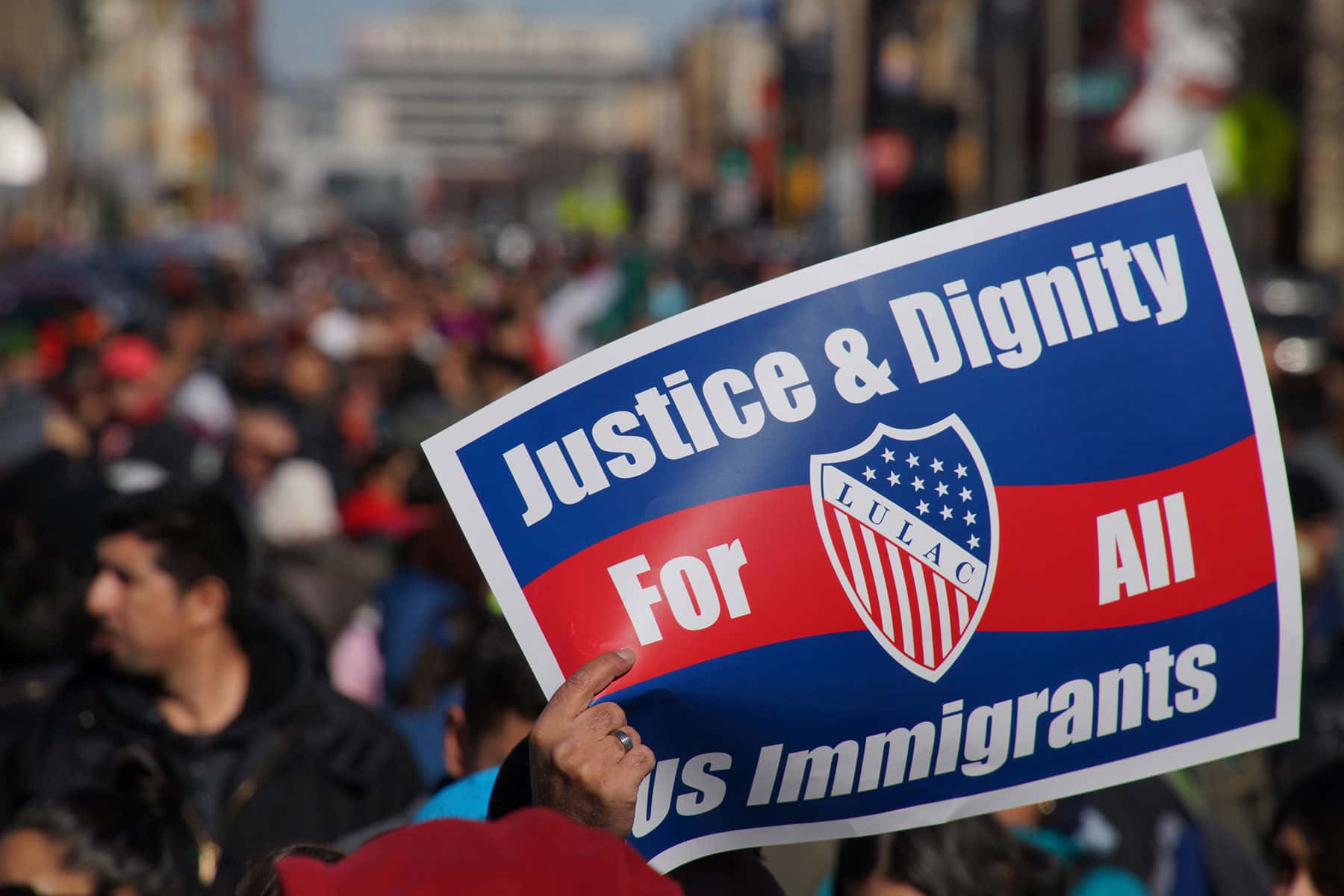
Representatives from the Milwaukee city government, along with community leaders and the League of United Latin American Citizens (LULAC), gathered at City Hall on February 22 to address the issues of concern about latest executive order about immigration issued by President Donald Trump.
“We are organizing throughout Wisconsin so that local law enforcement leaders will reject efforts to have them act as Immigration agents through the 287g program, and to instead affirm positive policies that build trust between law enforcement and diverse communities,” said Christine Neumann-Ortiz, Executive Director of Voces de la Frontera. “Local law enforcement must not turn people over to Immigration absent the due process protections of a judge’s order, and Immigration must be stopped from carrying out raids at courthouses. We are organizing in workplaces, businesses, neighborhoods, and places of worship to resist deportations and to mobilize massive economic disruption to stop these attacks on our families.”
Among other modifications to the original executive order, the new directive makes almost every undocumented person a priority for deportation, regardless of family or community ties. It also co-opts local law enforcement to aid in deportations.
It will prosecute parents seeking to reunite with their refugee children as human traffickers, and hire 10,000 additional Immigration Agents, to expand the already almost 20,000 ICE force. The measure would build new detention centers for immigrants, and remove due process protections to quickly carry out mass deportations.
“These directives demonstrate the cruelty and chaos Trump and his servant politicians, like Paul Ryan and Sheriff David Clarke, want to create to terrorize our families and communities,” added Neumann-Ortiz. “Now we know the specifics of their plan, but our movement has a plan too. Last week’s Days Without Immigrants strikes show that immigrant workers and business owners are ready to use their economic power to resist. Voces de la Frontera is organizing business owners and workers for a national general strike on May 1st to demand this campaign of state-sponsored terror against immigrant families be stopped in its tracks.”
Elana Kahn, director of the Jewish Community Relations Council of the Milwaukee Jewish Federation, offered a history lesson about the struggle of Jewish immigrants to reach America.
“In 1921 and 1924, Congress passed laws strictly limiting immigration according to nation-based quotas. The laws were controversial. They dramatically reduced the number of Europeans allowed to enter the US and made permanent an already existing near total ban on Asian immigrants. These people, it was understood, presented political, racial and cultural threats to the United States.
“Three of my four grandparents arrived several years before then, entering this country before the gates closed. But if they hadn’t, perhaps they would be among the estimated tens of thousands of European Jews who entered this country illegally – by sailing into the ports of NY with fake German passports, by arriving in Florida by hiding in boats from Cuba, by sneaking across the Canadian border or trekking from Mexico.
“Until recently, I had no idea that Jewish immigrants had entered the US illegally. That was not our story. But it is our story, as Jews and as Americans. Our nation has often struggled to enact policies that balance our national security interests with a whole set of other needs – fiscal, logistical, and humanitarian needs. But balance is what we need.
“My tradition calls on us to welcome the stranger. In Leviticus, we are told: ‘When strangers sojourn with you in your land, you shall not do them wrong. The strangers who sojourn with you shall be to you as the natives among you, and you shall love them as yourself, for you were strangers in the land of Egypt.’
“The history of my community, Jewish Americans, and every other community that makes up the patchwork of ethnicities in our diverse nation calls on us to provide an effective legal immigration system characterized not only by national security, but by compassion. We cannot allow fear to dictate policy.
“Yes, our leaders must work to protect national security. The weight of that responsibility surely lies on our president’s shoulders. But we are not safer when we close our gates, when we treat asylum seekers like criminals, when we drive people underground. The inconvenient truth is that immigrants commit fewer crimes than native born Americans.
“We call on President Trump to move carefully and to develop compassionate immigration policies, including a systematic, fair path to citizenship for undocumented immigrants. I am proud to stand with my brothers and sisters in the Latino community, to speak with immigrants who arrived after my family, and to together be a voice of reason:
“We are a nation of laws but we are also a nation driven by a commitment to shared values of welcoming the stranger, recognizing the image of God in all people, and treating every human being with compassion and care.”
Alderman Jose Perez, presented his concern for the well-being of the Milwaukee community, as a result of the new presidential action.
“The question facing our country today is a simple one, who are we? Let me start with who we are not. We are not a country that would accept Muslims being targeted for hate crimes or by law-enforcement because of their religion. We are not a country that will accept our Jewish brothers and sisters been targeted with bomb threats at community centers, or cemeteries being vandalized. We are not a country that will accept Latino an immigrant families being torn apart, not for safety or sensible policy, but simply racist politics.
“Now, the administration says the new travel band will accomplish the same policy outcomes as the previous policy, and we know this policy was blocked by federal courts. So we won’t stand for it. I come from immigrants. I am proud to represent a district of immigrants, some Polish, some Mexican, some Vietnamese, and some from other places.
“I didn’t run for office to lead some strange fight against my own government. I ran to do what I could to help all the residents of this city get what everyone wants for themselves and their families. And that’s a dry, warm place to sleep, a job at a fair wage, a park to enjoy a warm February day, and access to some basic services. And I don’t believe that those who deny these things to someone because of where they are from, what they look like, or the name of the God they worship, represent the majority of us or our government.
“That is why ‘us’ versus ‘them’ is false. The truth is that they have no real power. We see them in their darkness, we reject their thoughts and hateful words, we stand together in a way that they cannot overcome. So I’m proud to stand here today with my brothers and sisters, for the country we believe in. A country of tolerance, a country that believes in the free expression of religion, a country that welcomes all, a country that believes in prosperity for all, a country that was built on the labor, brains, sweat, and ingenuity of immigrants. That is what we are, that’s what we will be.”
The Milwaukee Public Schools also issued a letter from Superintendent saying that MPS believes in the equitable and fair treatment of all students and families. The district welcomes individuals of all ethnicities, religions, cultural backgrounds, immigration status, and sexual orientation or identity.
“In this district, we are all valued and no one is pushed aside, this is a safe haven of learning and support” said Darienne B. Driver, Ed.D. “Since we are a family, we care for the well-being of each other by creating safe spaces and rejecting actions that target personal traits, backgrounds, or beliefs. Our nondiscrimination policy states that no person is discriminated against based on race, national origin, gender identity, religion, sexual orientation, ability level, or any other part of their identity. Diversity defines us and is our strength.”
Federal immigration law both imposes the responsibility and provides the means for the federal government, in cooperation with the states, to secure the nation’s borders. The purpose of this order is to direct executive departments and agencies to deploy all lawful means to secure the nation’s southern border with Mexico, to prevent further illegal immigration into the United States, and to repatriate illegal aliens swiftly, consistently, and humanely.
This includes, among other provisions, establishing operational control of the border, establishing and controlling a physical barrier, detaining illegal aliens at or near the border, ending the practice of “catch and release,” and returning aliens to the territory from which they came pending formal proceedings.
This order also directs the Secretary of Homeland Security to hire an additional 5,000 border agents and to empower state and local law enforcement to support federal enforcement of immigration law, to the maximum extent permitted by law, and to ensure that prosecution guidelines place a high priority on crimes having a nexus to our southern border.
- Enforcing the law. Under this executive order, with extremely limited exceptions, DHS will not exempt classes or categories of removal aliens from potential enforcement. All of those in violation of the immigration laws may be subject to enforcement proceedings, up to and including removal from the United States. The guidance makes clear, however, that ICE should prioritize several categories of removable aliens who have committed crimes, beginning with those convicted of a criminal offense.
- Establishing policies regarding the apprehension and detention of aliens. U.S. Customs and Border Protection (CBP) and U.S. Immigration and Customs Enforcement (ICE) will release aliens from custody only under limited circumstances, such as when removing them from the country, when an alien obtains an order granting relief by statute, when it is determined that the alien is a U.S. citizen, legal permanent resident, refugee, or asylee, or that the alien holds another protected status, when an arriving alien has been found to have a credible fear of persecution or torture and the alien satisfactorily establishes his identity and that he is not a security or flight risk, or when otherwise required to do so by statute or order by a competent judicial or administrative authority.
- Hiring more CBP agents and officers. CBP will immediately begin the process of hiring 5,000 additional Border Patrol agents, as well as 500 Air & Marine agents and officers, while ensuring consistency in training and standards.
- Identifying and quantifying sources of aid to Mexico. The President has directed the heads of all executive departments to identify and quantify all sources of direct and indirect federal aid or assistance to the government of Mexico. DHS will identify all sources of aid for each of the last five fiscal years.
- Expansion of the 287(g) program in the border region. Section 287(g) of the INA authorizes written agreements with a state or political subdivision to authorize qualified officers or employees to perform the functions of an immigration officer. Empowering state and local law enforcement agencies to assist in the enforcement of federal immigration law is critical to an effective enforcement strategy, and CBP and ICE will work with interested and eligible jurisdictions.
- Commissioning a comprehensive study of border security. DHS will conduct a comprehensive study of the security of the southern border (air, land, and maritime) to identify vulnerabilities and provide recommendations to enhance border security. This will include all aspects of the current border security environment, including the availability of federal and state resources to develop and implement an effective border security strategy that will achieve complete operational control of the border.
- Constructing and funding a border wall. DHS will immediately identify and allocate all sources of available funding for the planning, design, construction, and maintenance of a wall, including the attendant lighting, technology (including sensors), as well as patrol and access roads, and develop requirements for total ownership cost of this project.
- Expanding expedited removal. The DHS Secretary has the authority to apply expedited removal provisions to aliens who have not been admitted or paroled into the United States, who are inadmissible, and who have not been continuously physically present in the United States for the two-year period immediately prior to the determination of their inadmissibility, so that such aliens are immediately removed unless the alien is an unaccompanied minor, intends to apply for asylum or has a fear of persecution or torture in their home country, or claims to have lawful immigration status. To date, expedited removal has been exercised only for aliens encountered within 100 air miles of the border and 14 days of entry, and aliens who arrived in the United States by sea other than at a port of entry. The Department will publish in the Federal Register a new Notice Designating Aliens Subject to Expedited Removal Under Section 235(b)(1)(a)(iii) of the Immigration and Nationality Act that expands the category of aliens subject to expedited removal to the extent the DHS Secretary determines is appropriate, and CBP and ICE are directed to conform the use of expedited removal procedures to the designations made in this notice upon its publication.
- Returning aliens to contiguous countries. When aliens apprehended do not pose a risk of a subsequent illegal entry, returning them to the foreign contiguous territory from which they arrived, pending the outcome of removal proceedings, saves DHS detention and adjudication resources for other priority aliens. CBP and ICE personnel shall, to the extent lawful, appropriate and reasonably practicable, return such aliens to such territories pending their hearings.
- Enhancing Asylum Referrals and Credible Fear Determinations. U.S. Citizenship and Immigration Services (USCIS) officers will conduct credible fear interviews in a manner that allows the interviewing officer to elicit all relevant information from the alien as is necessary to make a legally sufficient determination. USCIS will also increase the operational capacity of the Fraud Detection and National Security Directorate.
- Allocating resources and personnel to the southern border for detention of aliens and adjudication of claims. CBP and ICE will allocate available resources to expand detention capabilities and capacities at or near the border with Mexico to the greatest extent practicable. CBP will focus on short-term detention of 72 hours or less; ICE will focus on all other detention capabilities.
- Properly using parole authority. Parole into the United States will be used sparingly and only in cases where, after careful consideration of the circumstances, parole is needed because of demonstrated urgent humanitarian reasons or significant public benefit. Notwithstanding other more general implementation guidance, and pending further review by the Secretary and further guidance from the Director of ICE, the ICE policy directive with respect to parole for certain arriving aliens found to have a credible fear of persecution or torture shall remain in full force and effect.
- Processing and treatment of unaccompanied alien minors encountered at the border. CBP, ICE, and USCIS will establish standardized review procedures to confirm that alien children who are initially determined to be unaccompanied alien children continue to fall within the statutory definition when being considered for the legal protections afforded to such children as they go through the removal process.
- Putting into place accountability measures to protect alien children from exploitation and prevent abuses of immigration laws. The smuggling or trafficking of alien children into the United States puts those children at grave risk of violence and sexual exploitation. CBP and ICE will ensure the proper enforcement of our immigration laws against those who facilitate such smuggling or trafficking.
- Prioritizing criminal prosecutions for immigration offenses committed at the border. To counter the ongoing threat to the security of the southern border, the directors of the Joint Task Forces-West, East, and Investigations, as well as the ICE-led Border Enforcement Security Task Forces (BESTs), are directed to plan and implement enhanced counter-network operations directed at disrupting transnational criminal organizations, focused on those involved in human smuggling.
- Public Reporting of Border Apprehensions Data. In order to promote transparency, CBP and ICE will develop a standardized method for public reporting of statistical data regarding aliens apprehended at or near the border for violating the immigration law.














